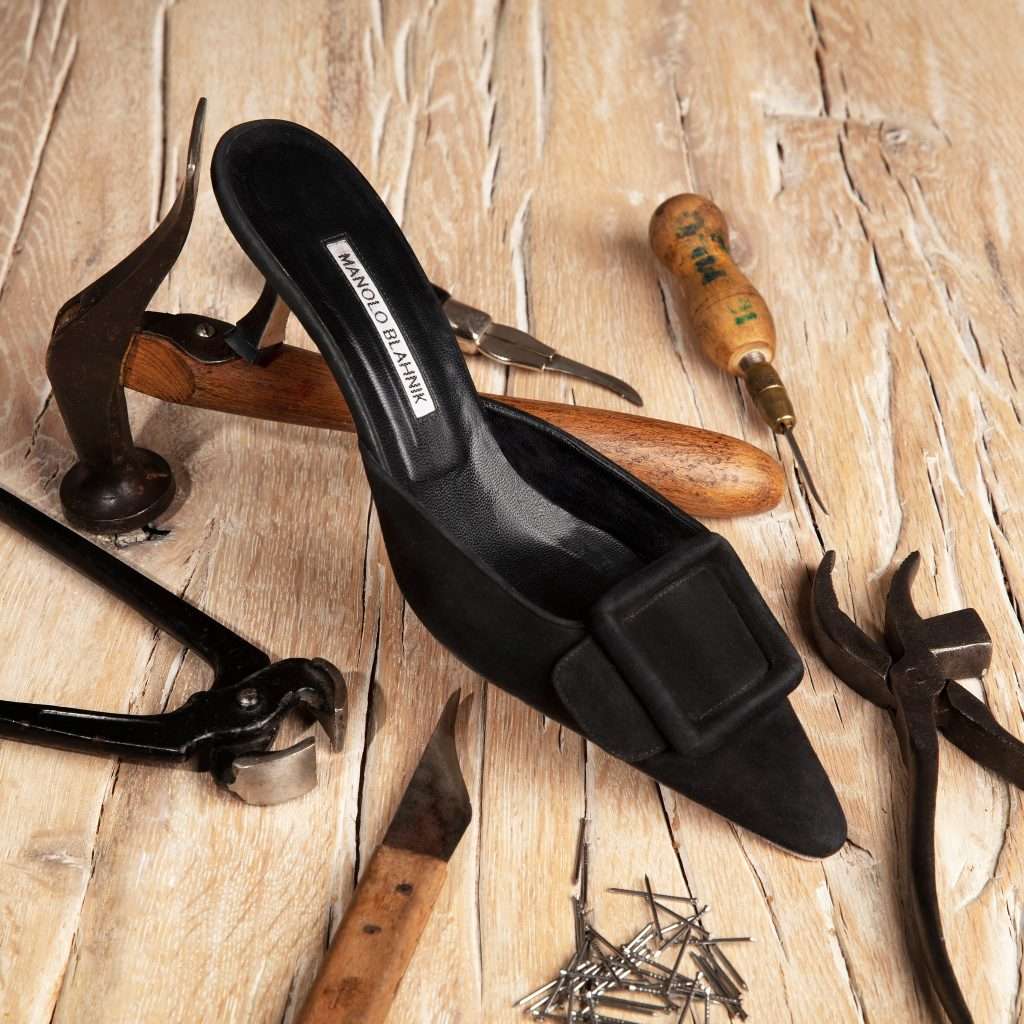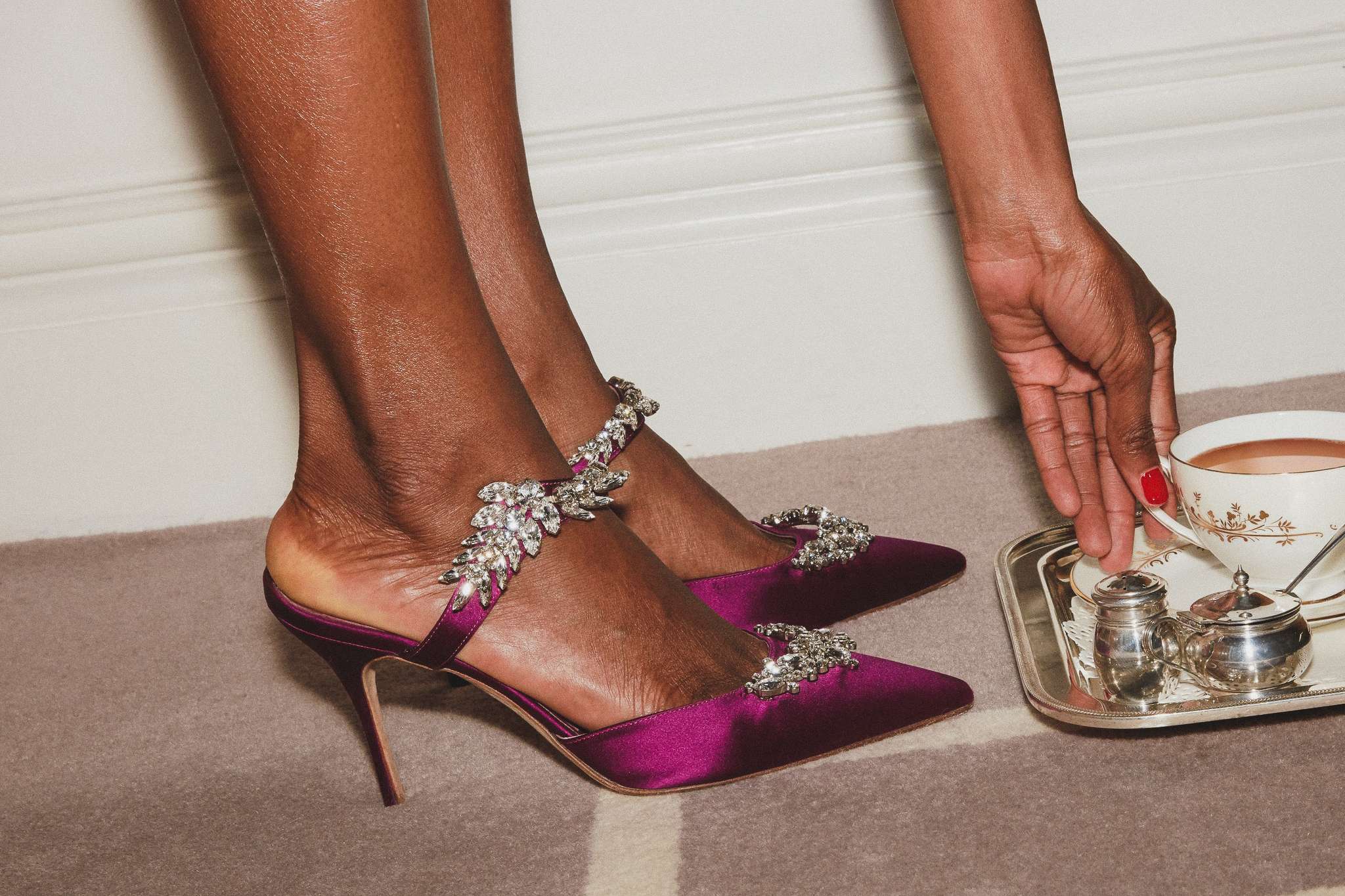Manolo Blahnik is known for its shoes, but not its sustainability initiatives. That’s all about to change with an innovative post-purchase repair partnership with The Restory aimed at extending the life cycle of the luxury brand’s footwear.
‘Mend My Manolos’ is the first of its kind partnership for The Restory and for luxury shoemaker, Manolo Blahnik. The program will allow aftercare for customers around the world via the the Manolo Blahnik website and through its three UK boutiques. All items will be shipped to The Restory’s London-based atelier. There, the shoes will be assessed and repaired for a fee. Services offered include re-soling, re-heeling, restoration, and re-dyeing. It’s all part of what the brand says is an effort to “extend the longevity of the promise that comes with an investment piece.”
“Beautifully crafted, timeless investments to be treasured for a lifetime is what we strive to create in every pair of shoes at Manolo Blahnik,” Manolo Blahnik chief executive Kristina Blahnik said in a statement. “We are thrilled to be partnering with The Restory, a business who understands the value of artisanry and craftsmanship and who is passionate about bringing well-loved pieces back to life.”
The aftercare boom
Like the secondhand sector’s recent demand explosion, aftercare is also a booming sector of the luxury fashion market, estimated at more than $200 billion, according to The Restory. It’s more than just caring for luxury pieces, though, the brand says—it’s a way to foster responsible sustainable strategies in the fashion world.
And that can’t happen too soon. Fashion and textile waste are leading producers of greenhouse gas emissions and landfill waste.

“We started The Restory to make aftercare fun and stylish and as much a part of the fashion experience as buying to begin with,” Vanessa Jacobs, founder and chief executive of The Restory, said in a statement. “We have spent four years cracking the complexity of aftercare, partnering with some of the UK’s leading luxury retailers to help customers fall in love again and again with their investment pieces.
“Few brands epitomise fun, style and investment-in-self better than our first brand partner Manolo Blahnik and we are excited to be leveraging our tech, data and craftmanship to power aftercare for such an iconic brand, championing a sustainable approach to luxury and helping the industry advance towards a greener future.”
Sustainability at Manolo Blahnik’s
Blahnik’s sustainability initiatives have been largely lacking, though. In 2011, the brand partnered with Marcia Patmos on a collection that featured the skins of dead tilapia fish, along with cork, and raffia.
“I am always researching sustainable materials and developments. I love the idea of tilapia skin because it is a by-product of the food industry that would otherwise be discarded, but it’s actually a beautiful material perfect for small leather goods,” Patmos told Vogue.
But there’s been little else since. The brand’s environmental policies—if they even exist—have not been made public. That earned Blahnik a “not good enough” rating in 2019 from the Good on You Directory. According to the Directory, the brand has not published policies about its people, planet, or animal initiatives. Its labor practices were also called into question and there’s no evidence the brand has a code of conduct, ensures payment of living wages in its supply chain, or conducts any audits of its suppliers.

But since the pandemic started, the brand updated its website to include commitments to several non-profits working across mental health issues, stray dogs, and reforestation efforts.
One of the initiatives is a partnership with the group Treedom and the creation of the Manolo Blahnik Global Family Forest, which it announced last Earth Day on behalf of each of its employees.
“The Manolo Blahnik Family Forest is a transparent way of showing our commitment to becoming more responsible,” the brand said in a statement on the Treedom website. “The planting helps to offset our carbon impact, while also boosting the livelihoods of local farmers across the developing world.”
The initiative contributed to 10 of the 17 Sustainable Development Goals set by the UN Member States for 2030, the brand says.


